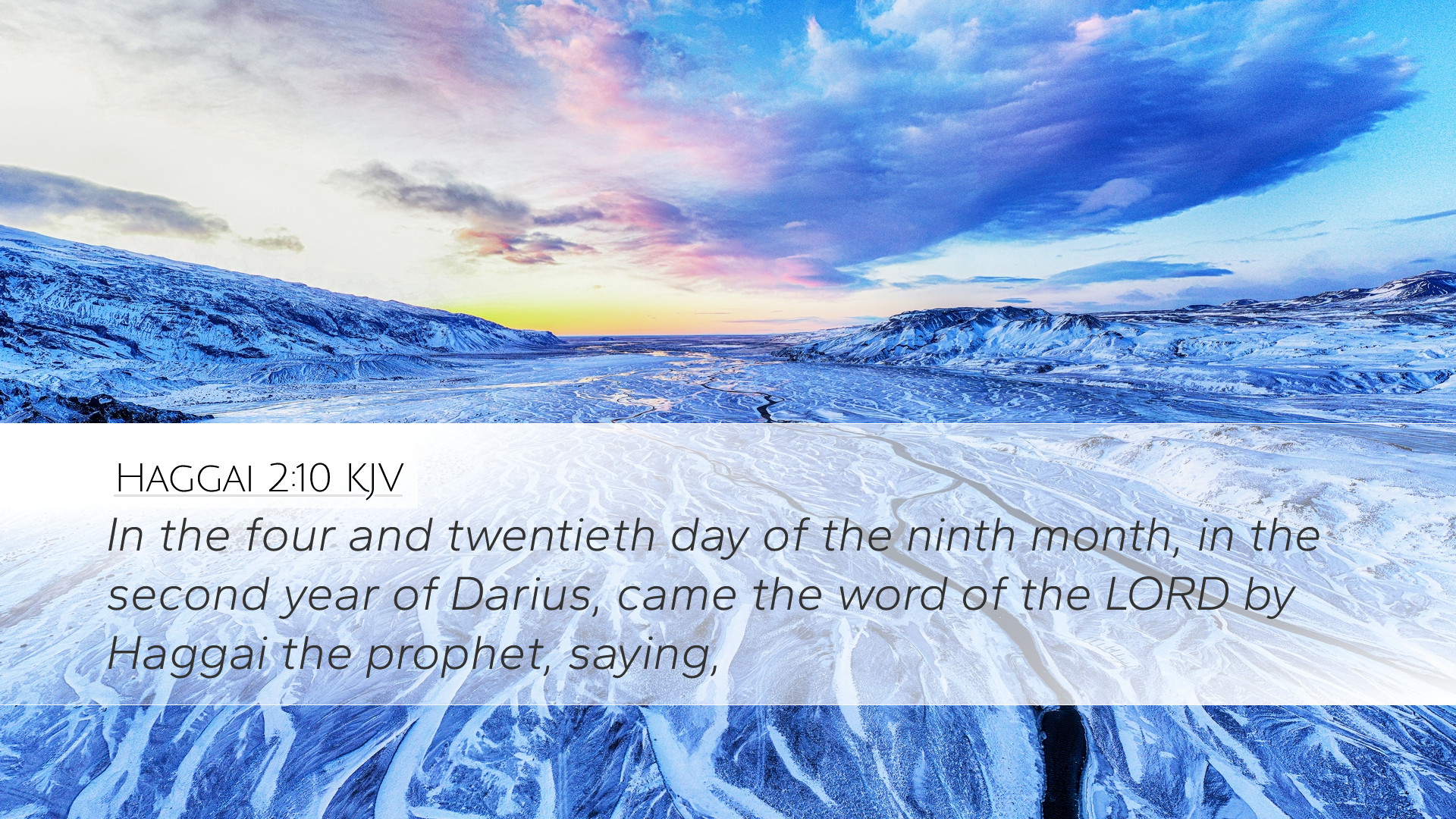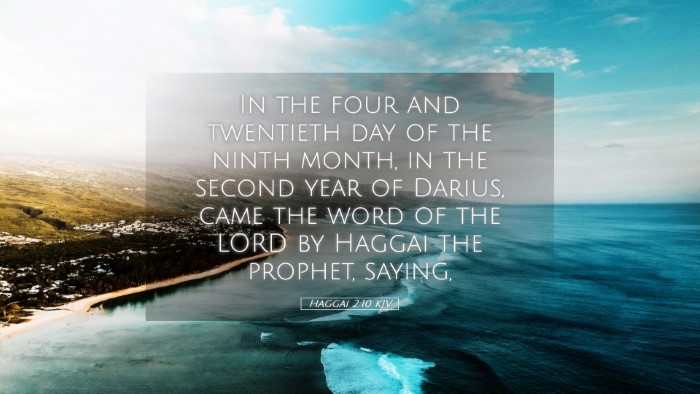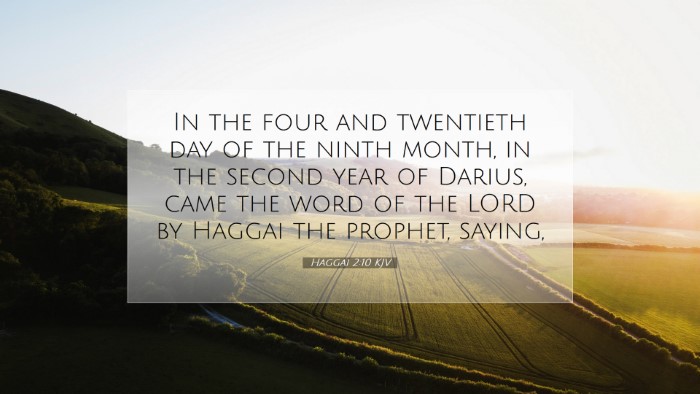Old Testament
Genesis Exodus Leviticus Numbers Deuteronomy Joshua Judges Ruth 1 Samuel 2 Samuel 1 Kings 2 Kings 1 Chronicles 2 Chronicles Ezra Nehemiah Esther Job Psalms Proverbs Ecclesiastes Song of Solomon Isaiah Jeremiah Lamentations Ezekiel Daniel Hosea Joel Amos Obadiah Jonah Micah Nahum Habakkuk Zephaniah Haggai Zechariah MalachiHaggai 2:10
Haggai 2:10 KJV
In the four and twentieth day of the ninth month, in the second year of Darius, came the word of the LORD by Haggai the prophet, saying,
Haggai 2:10 Bible Commentary
Commentary on Haggai 2:10
Verse Context and Historical Background
The book of Haggai is set within a post-exilic context, around 520 BC, during the reign of Darius I. The Jewish people had returned to Jerusalem after the Babylonian Exile, and they were tasked with rebuilding the temple. Haggai's prophecies focus on awakening the people to the urgency of completing the temple as a sign of their restored relationship with God.
Analysis of Haggai 2:10
Haggai 2:10 states:
"On the twenty-fourth day of the ninth month, in the second year of Darius, the word of the Lord came to Haggai the prophet."
This verse marks a specific time for God’s message, underlining the significance of divine communication. The mention of the date provides a concrete historical anchor and emphasizes the importance of the timing of God's revelations to His people.
Theological Implications
This verse raises several theological implications regarding the nature of holiness and sin. Through Haggai's proclamations, God seeks to clarify the misunderstanding among the people concerning how physical and spiritual realities interact.
- Holiness and Defilement: Matthew Henry notes that holiness is not transmitted like defilement. He illustrates this point by explaining that a holy thing does not make those who touch it holy, but rather it is sin that has destructive and contagious effects.
- Divine Authority: According to Albert Barnes, the emphasis placed on the phrase “the word of the Lord” underscores divine authority and intention behind the message delivered. It reflects God’s direct involvement in guiding His people, even amidst their neglect of His commandments.
- Call to Repentance: Adam Clarke emphasizes that the purpose of Haggai’s message is to awaken the people's conscience. They were to realize their spiritual state and the need for repentance and renewal in their covenant relationship with God.
Exegesis and Analysis
The first aspect of exegesis is the timing of the declaration. The specific date of the message (the twenty-fourth day of the ninth month) signifies the importance of God’s word in short intervals and the urgent need for the people to reflect on their situation.
Henry suggests that the same way Haggai is commanded to deliver this word, Christians today should treat divine messages with urgency and reverence. Such alignment with God’s will is essential for the restoration of spiritual standing within the community.
Reflection and Application
For contemporary practitioners of the faith, this verse serves as a reminder that God still communicates in specific and orderly ways. The details provided in this scripture can be a model for believers to reflect on the ways God speaks today and the importance of listening to His voice in structured ways.
Furthermore, the application of holiness can be considered within the context of the church. While one may engage in various holy acts, it does not automatically sanctify the performer if their life is in misconduct. Thus, churches and pastors must emphasize a true heart of repentance and obedience aligned with worship.
Insights from Commentators
- Matthew Henry: He states that the essential lesson here is about the maintaining of the holy, rather than distributing holiness. The need for the people to understand that their righteousness must stem from a heart surrendered to God fuels their communal worship and actions.
- Albert Barnes: His analysis points to the duality of honor and shame in presenting offerings to God, emphasizing the necessity of purity in both offerings and the offerer. He suggests that the temple structure and its contents are a direct reflection of the people's moral and spiritual state.
- Adam Clarke: Clarke highlights the prophetic nature of Haggai's call, urging individuals to pursue holiness earnestly. His commentary draws parallels with modern worship practices and how the integrity of the worshiper is as crucial as the formal act of worship itself.
Conclusion
Haggai 2:10 is a profound reminder that God’s instructions remain relevant to the church today. The specificity of God’s communication, the nature of holiness, and the call to both personal and communal repentance emphasizes a timeless principle: divine engagement requires an attentive and responsive heart.
This verse and its accompanying commentaries call upon scholars, pastors, and students of theology to consider how neglect of holiness affects worship and community. The urgent call to restore God’s work and maintain true spiritual integrity reverberates through generations, a principle that every believer must take to heart.


